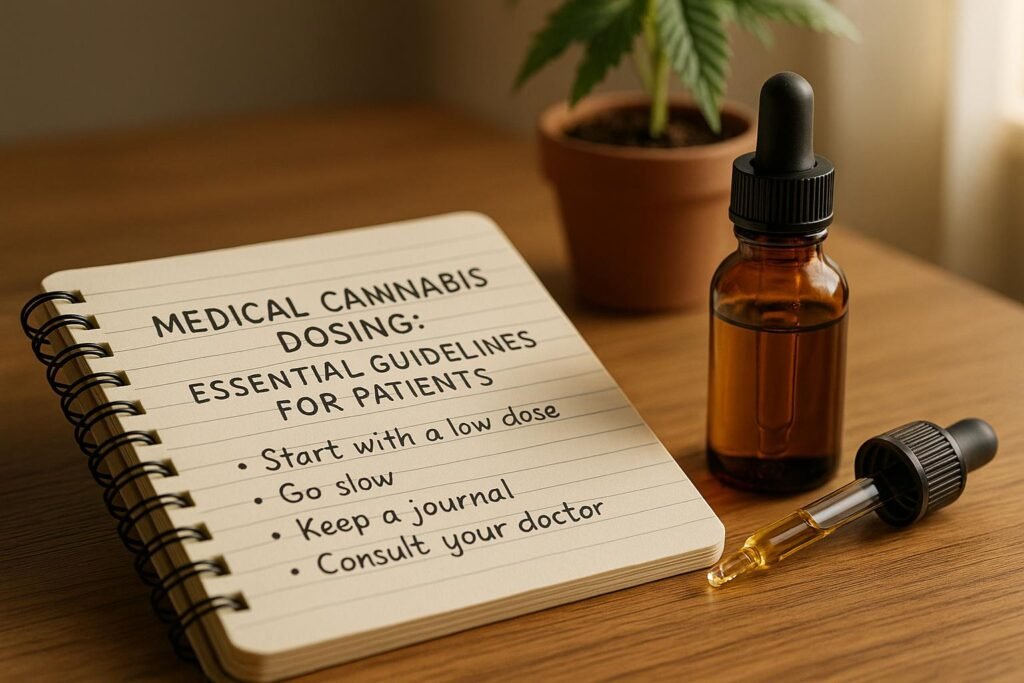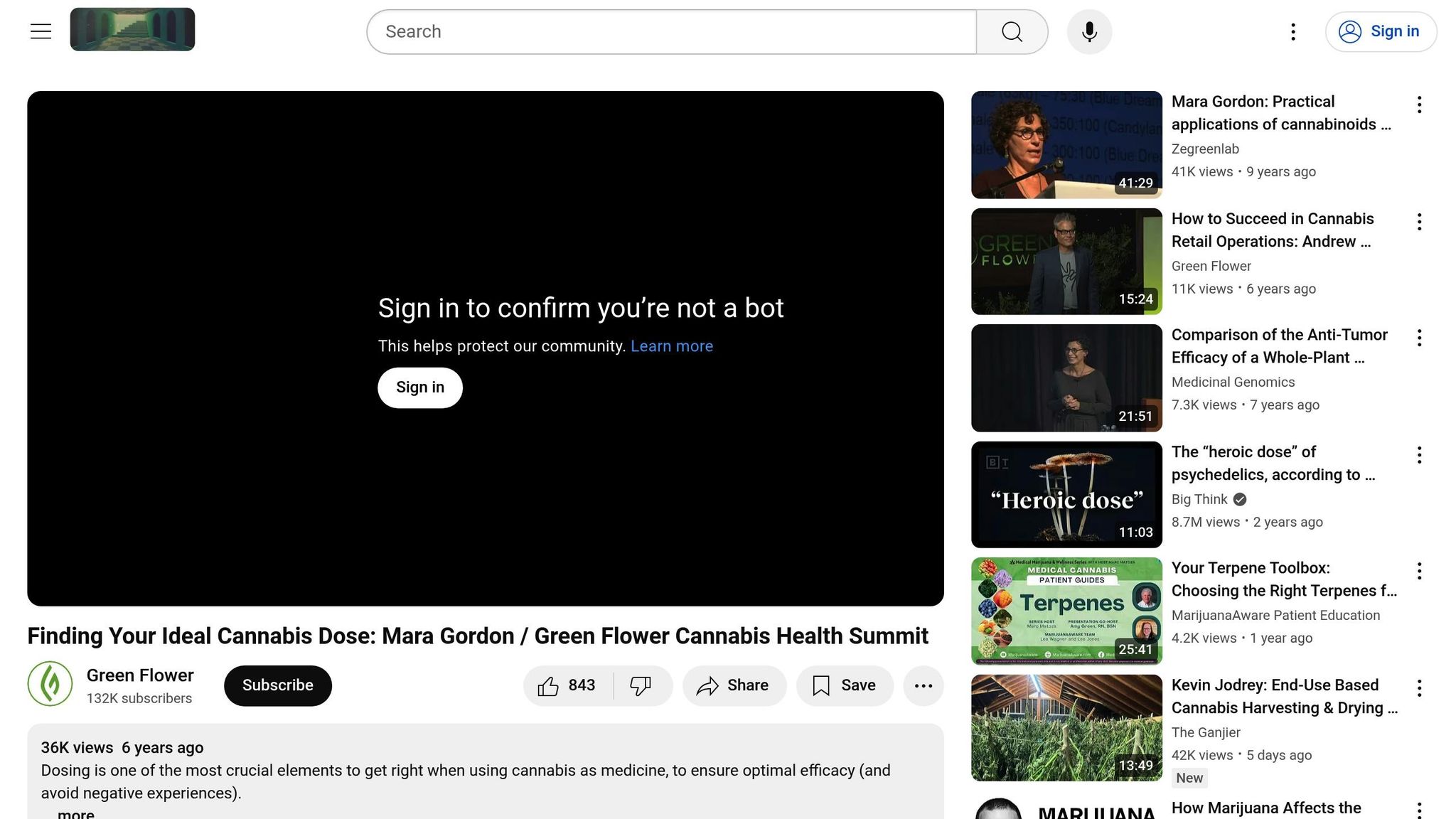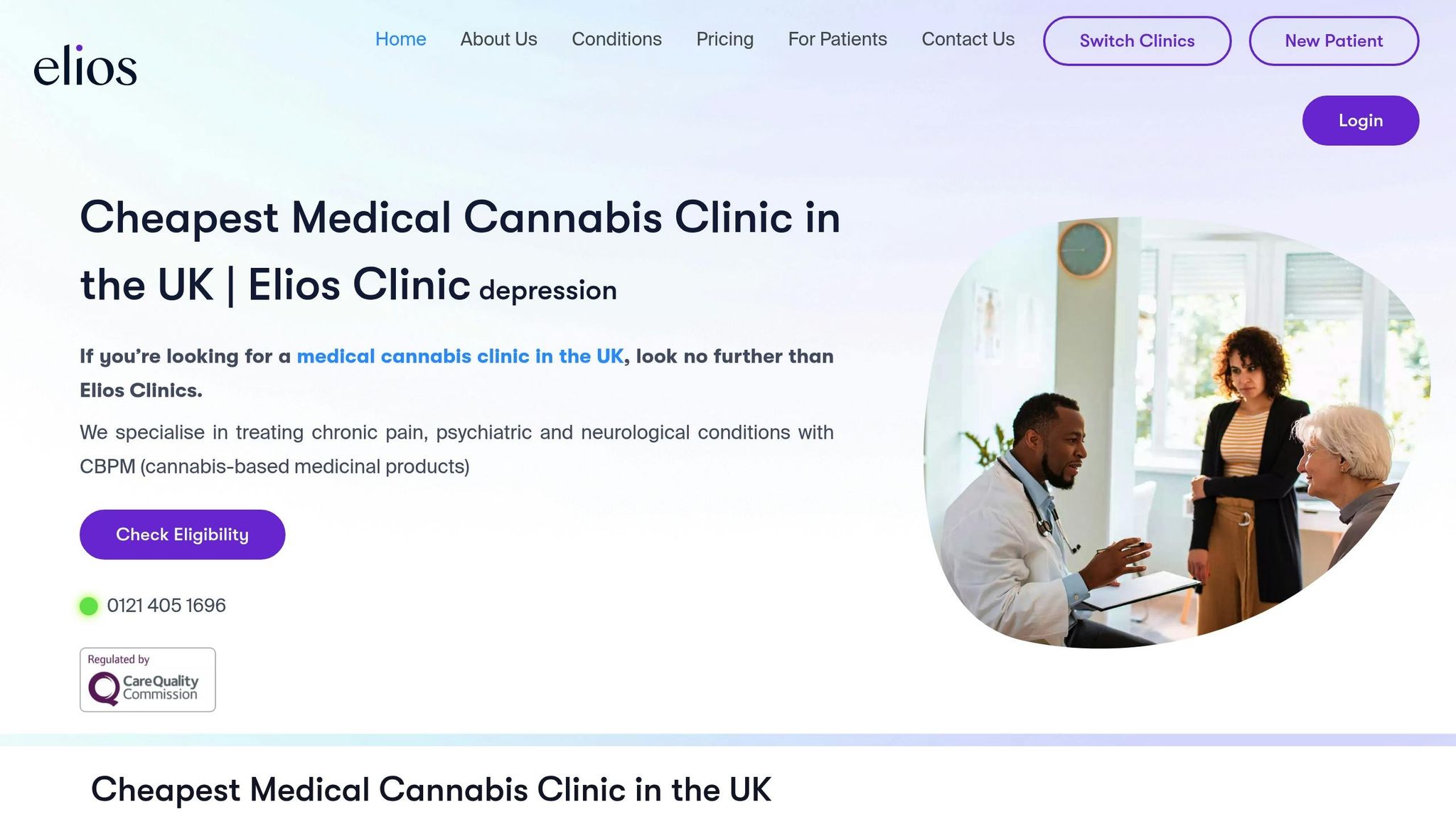Medical cannabis dosing is highly personal and requires careful planning. The right dose balances symptom relief with minimal side effects, considering factors like your health, the type of product, and how your body reacts. Here’s what you need to know:
- Cannabinoids: CBD (non-psychoactive) offers calming effects, while THC provides pain relief but can cause a “high”.
- Legal Use in the UK: Only specialist doctors can prescribe medical cannabis for specific conditions. Approved products include Epidyolex (for epilepsy) and Sativex (for multiple sclerosis).
- Dosing Factors: Age, weight, health conditions, and tolerance affect how much cannabis you need. Product types (oils, capsules, vapes) and CBD-to-THC ratios also play a role.
- Safe Dosing: Start with a low dose and increase gradually under medical supervision. Track symptoms to find the smallest effective amount.
- Support Tools: Use dose tracking charts and digital platforms like the Elios Clinics dashboard to monitor progress and manage prescriptions.
Work closely with your doctor and use structured methods to ensure safe, effective treatment.
Finding Your Ideal Cannabis Dose: Mara Gordon / Green Flower Cannabis Health Summit
Factors That Affect Medical Cannabis Dosing
Determining the right dosage of medical cannabis is a highly individualised process. Doctors take into account several factors to create a treatment plan that aligns with each patient’s unique needs and circumstances.
Patient Health Factors
Your overall health plays a big role in finding the right dose. Age, for instance, can affect how your body metabolises cannabis. Older adults often require lower doses and slower adjustments. Similarly, body weight and medical history – such as liver or heart conditions or the use of medications that affect the central nervous system – can influence how much cannabis is appropriate.
If you’re new to cannabis, starting doses are typically very small, especially for THC or CBD. On the other hand, those with prior experience might begin with slightly higher amounts. These health details also help determine which cannabis products and formulations will work best for you.
Product Types and Cannabinoid Ratios
The type of cannabis product and its cannabinoid content are equally important in deciding dosage. Different products – like oils, dried flowers, or capsules – are absorbed and processed by the body in unique ways.
- Sublingual oils and tinctures: Offer quicker absorption and precise dosing.
- Capsules: Provide consistent effects but take longer to kick in.
- Vaped products: Work rapidly but are harder to dose accurately.
Another key factor is the ratio of CBD to THC in the product. Higher CBD and lower THC ratios allow for more generous dosing without significant psychoactive effects. However, products with balanced or THC-dominant ratios usually require a more cautious approach due to the potential for stronger effects.
Tolerance and Individual Response
Tolerance, especially to THC, can develop over time and may necessitate adjustments to the dose. Genetic factors and metabolic rates also affect how individuals respond to cannabis. Some people might need higher doses or more frequent use to achieve the desired effects.
Older adults, who are often more sensitive to THC, are typically better suited for CBD-dominant products with gradual dose increases, particularly when managing multiple health conditions. For patients dealing with complex issues – like chronic pain alongside anxiety – careful balancing of cannabis formulations is essential to address their symptoms effectively without causing unwanted side effects.
Safe Dosing Methods
Working closely with your doctor and following a structured approach can help you get the most out of your treatment while keeping side effects to a minimum. This process takes into account individual factors and product specifics discussed earlier.
Start Low, Go Slow Approach
The “start low, go slow” method is a key principle in safe medical cannabis dosing. It involves beginning with a very small dose and increasing it gradually until you achieve relief. Starting with a low dose gives your body time to adapt, reducing the likelihood of side effects like dizziness, fatigue, or anxiety.
Your doctor will guide you on how long to wait between dose adjustments, depending on how quickly the product is absorbed. This method ensures you have enough time to evaluate each dose’s effect and find the smallest effective dose that works for you.
CBD and THC Dose Adjustment Guidelines
When applying the “start low, go slow” approach, dosing adjustments vary depending on the cannabinoid. For CBD, treatment typically begins with a very low dose. If you tolerate the initial dose well, small, gradual increases may be recommended until you find the dose that effectively manages your symptoms. CBD is generally well tolerated, allowing for more flexibility in dose adjustments.
THC dosing, on the other hand, requires extra care because of its psychoactive effects. Treatment usually starts with a low dose, often taken in the evening to minimise any impact on daytime activities. Your doctor will carefully adjust the dose at intervals based on your response and tolerance. For products containing both CBD and THC, the balance between the two is tailored to your therapeutic needs. Products with a higher proportion of CBD may allow for more leeway in adjustments, while balanced formulations often require a more cautious approach.
Tracking Symptoms and Adjusting Doses
Monitoring your symptoms regularly is a vital part of effective treatment. Successful medical cannabis use depends on consistent tracking and ongoing discussions with your doctor. Keeping a detailed log of your symptoms, the timing of doses, and any side effects provides crucial information for refining your treatment plan. Make notes about daily pain levels, sleep quality, mood changes, and any unexpected reactions, as well as when you notice improvements.
At Elios Clinics, patients use a dedicated patient dashboard to record their daily experiences and manage prescription details. This digital tool helps identify trends and ensures accurate information is available during follow-up consultations.
Regular check-ins with your doctor are essential for safely adjusting your dose. These appointments allow your doctor to review your progress and make any necessary changes to your treatment plan. It’s important not to alter your dose on your own – always consult your medical team before making adjustments. If your current dose starts to lose its effectiveness, your doctor might suggest a short break from treatment or explore alternative formulations instead of continuously increasing the dose.
sbb-itb-24979b8
Dosing Support Tools and Resources
Managing medical cannabis treatment can feel overwhelming, but the right tools can make it much easier. These resources help you stay organised, communicate clearly with your healthcare team, and keep track of your progress for better outcomes.
Dose Tracking Charts and Monitoring Tools
Accurate dose management is key to effective treatment, and structured tools can help you stay on top of it. A dosing chart is one of the simplest yet most effective ways to track your treatment. Use it to log details like the time and amount of each dose, any symptoms you’re experiencing, and potential side effects. Over time, this information can reveal patterns and help you and your doctor pinpoint what’s working and what might need adjustment.
Be sure to include details about the specific product you’re using, such as its CBD and THC levels, as different formulations can have varying effects. Also, note the method of administration – whether it’s oils, capsules, or another form – because this can influence how quickly the medication takes effect and how long it lasts.
Many patients use a simple 1–10 scale to rate their symptoms. This numerical system makes it easier to spot trends and communicate changes clearly with your healthcare provider.
Elios Clinics Patient Dashboard Features
The Elios Clinics patient dashboard is designed to support the “start low, go slow” method of treatment. This digital platform helps you manage your medical cannabis journey in one convenient place. With the dashboard, you can track prescriptions, schedule appointments, and monitor your progress with ease.
One of its standout features is the ability to request repeat prescriptions 24/7. It also keeps a comprehensive record of your treatment history, so both you and your healthcare team can review your progress and make informed decisions about any necessary adjustments.
“Through our digital support and monitoring services, we’re able to stay in touch with our patients and ensure that their treatment is effective. We can adjust their treatment plans as needed, answer any questions they may have, and monitor their progress remotely.” – Elios Clinics
The dashboard’s remote monitoring capabilities mean your care team can check in on your progress between appointments. This allows them to offer timely guidance and make adjustments as needed, ensuring your treatment remains both effective and safe.
Regular Follow-Up Appointments for Dose Changes
While digital tools are helpful, regular face-to-face consultations with your doctor are essential for fine-tuning your treatment. Scheduled follow-ups – whether monthly or quarterly – allow your doctor to review your progress and make necessary adjustments. If you need additional consultations, they’re available for £50 per session.
During these appointments, your doctor will go over your dosing chart and dashboard data to ensure any changes to your treatment are made safely. Always consult your doctor before making dose adjustments on your own – professional guidance is crucial for maintaining safety and effectiveness.
At Elios Clinics, follow-up care is built into their subscription plans, giving you consistent access to expert support. These appointments are also a chance to address any concerns or questions you may have. If your medication starts to lose its effectiveness, your doctor might recommend treatment breaks or explore alternative formulations instead of simply increasing your dose. This thoughtful approach helps maintain the effectiveness of your treatment while reducing the risk of tolerance over time.

Safe Medical Cannabis Dosing Summary
Safe cannabis dosing hinges on a personalised approach, following the principle of “start low, go slow.” This strategy ensures that treatment is tailored to each individual’s needs, taking into account factors like medical conditions, body weight, metabolism, and prior cannabis use. Unlike conventional medications, there’s no one-size-fits-all solution for medical cannabis.
Professional guidance plays a crucial role in this process. At Elios Clinics, GMC-approved specialist doctors design customised treatment plans that align with your unique medical needs and lifestyle. Their patient-centred approach fosters trust, open communication, and a strong doctor-patient relationship – key ingredients for achieving long-term success.
Regular consultations and digital monitoring tools are vital for maintaining safe and effective dosing. These check-ins enable your doctor to track your progress and fine-tune your treatment plan as needed, addressing potential issues before they arise. Digital tools also help you stay organised and provide valuable data that informs dose adjustments during consultations.
The journey to effective treatment is gradual, relying on careful dose adjustments and ongoing evaluations. By staying patient and maintaining consistent communication with your care team, you can build a solid foundation for successful and sustainable medical cannabis treatment.
FAQs
What is the best way to find the right CBD to THC ratio for my medical cannabis treatment?
Finding the right balance of CBD to THC in your medical cannabis treatment depends on several factors, including your specific condition, personal tolerance, and treatment goals. A 1:1 ratio is often a good place to start, offering a combination of therapeutic benefits while keeping psychoactive effects to a minimum. If you’re new to medical cannabis, starting with higher CBD ratios like 4:1 or 2:1 is generally advised, as these can help minimise the chances of unwanted side effects from THC.
Begin with a low dose and adjust slowly, paying close attention to how your body reacts. It’s essential to consult your prescribing clinician to ensure that the dosage and ratio are tailored to your individual needs, providing both safety and effectiveness.
What should I do if my current medical cannabis dose stops working effectively?
If your current medical cannabis dose isn’t delivering the results you need, it may be time to adjust it – but this should always be done with care and under medical supervision. A common method is to increase the dose gradually, for example, by adding 2.5 mg of THC every few days. This “start low, go slow” approach allows you to monitor your body’s response while keeping potential side effects in check.
Before making any changes, it’s essential to consult your healthcare provider. They can offer tailored advice based on your specific condition, tolerance levels, and the product you’re using, ensuring the adjustment is both safe and effective.
How can the Elios Clinics dashboard help me manage my medical cannabis treatment effectively?
The Elios Clinics dashboard is crafted to make managing your medical cannabis treatment straightforward and stress-free. It offers a clear snapshot of your treatment plan, covering everything from prescriptions and upcoming appointments to tailored recommendations. With this tool, you can effortlessly keep track of your medication schedule and monitor your progress over time.
What’s more, the dashboard strengthens communication with your healthcare provider. It enables safe and timely adjustments to your dosage whenever necessary. By consolidating all essential details in one convenient place, it helps you stay organised and supported throughout your medical journey.



